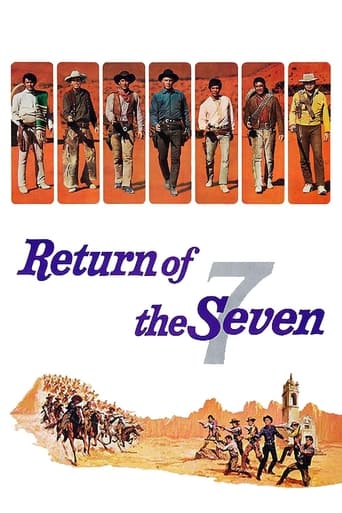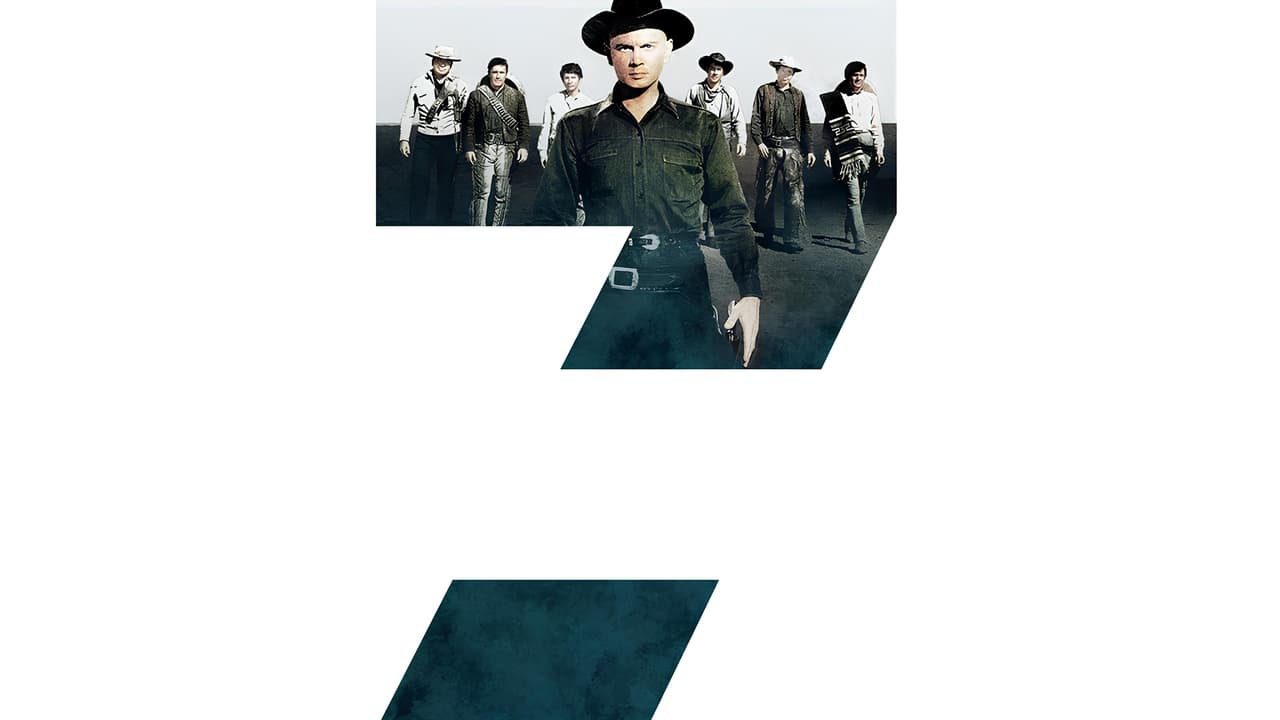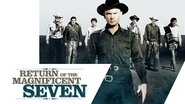ma-cortes
This is the second in the original series of four "Magnificent Seven" movies . This sequel to ¨Magnificent seven¨ is well played Yul Brynner as tough gunslinger named Chris who along with Vin , Robert Fuller, and their group set off in rescue some Mexican villagers . One day someone comes and takes most of the men prisoner . The villagers have been kidnapped by gunfighter bandits . Chico one of the remaining members of The Magnificent Seven now lives in the village that formerly helped and being also abducted . His wife named Petra (Elisa Montes replacing Rosanda Monteros) sets out to look for Chris, the leader of The Seven for help . Chris is decided to take a group and strike a blow against the Mexican bandits . Chris also meets Vin (Robert Fuller replacing Steve McQueen) another surviving members of The Seven . They find four other men and they go to help Chico (Julian Mateos substituting Horst Buchhold) , they are a womanizer (Warren Oates) , a revenger (Claude Akins), a highwayman (Virgilio Teixeira) and an orphan named Manuel (Jordan Christopher) . As Chris and his buddies , each of whom comes for a different reason , must free a Mexican village imprisoned by nasty outlaws (Emilio Fernandez , Rodolfo Acosta in similar roles to Calvera's Elli Wallach) who are devastating the small location . All of them get a chance to redeem themselves . Later on , the group develops a plan to secure the villagers defend it against enemy attack.Chris character was played by Yul Brynner in two occasions and one performed by Lee Van Cleef and George Kennedy . Brynner as a two-fisted pistolero is very good ; in fact , it was Yul Brynner who approached producer Walter Mirisch with the idea of doing a Western adaptation of Akira Kurosawa's classic, The seven Samurais. Yul insisted he would only make this film if Steve McQueen was not involved , McQueen felt the plot was too absurd and for this, and other reasons, was not interested anyway . The story is similar to previous entry , including customary outlaw band formed by an eclectic gang with diverse characters as well as speciality , as dynamite or guns . The film gets action Western , exciting riding, shootouts, it's funny and entertaining , although nothing new but displays a slight style . The movie contains some moment of violence and even touching on the relationships between the villagers and the Magnificent. Being a Spanish/US co-production , there appears several actors usual in Spaghetti-Paella Western such as Julian Mateos , Ricardo Palacios , Elisa Montes , Carlos Casaravilla and Fernando Rey playing his ordinary role as a priest . This is a passable though inferior sequel from the original and enduringly popular ¨The magnificent seven¨( John Sturges,1960) that is equally remake of ¨The seven samurais¨ (Akira Kurosawa) . After that , followed ¨The return of the seven¨(Burt Kennedy,1966), again with Brynner and ¨Guns of the magnificent seven¨ (Paul Wendkos,1969) with George Kennedy and ¨The Magnificent seven ride¨ with Lee Van Cleef by George McCowan and continued with a TV series and a Television movie realized in 1998 . As always, breathtaking and memorable musical score by Elmer Berstein ; Elmer , whose score for this movie is one of the best-known ever composed, also wrote the soundtrack for the parody of this film, 'Three amigos'. Appropriate cinematography by expert cameraman Paul Vogel , filmed on location in Colmenar , Alicante , Nuevo Baztán, Madrid, Samuel Bronston Studios, Madrid, and , of course , Almeria , Spain . Although this film revisits the village from the first movie, it was shot in Spain, not Mexico. Among the many reasons were the difficulties that occurred between the American filmmakers and the Mexican crew and government censors during the shooting of the first film .The motion picture was professionally directed by Burt Kennedy .He initially was screenwriter , his initial effort, ¨Seven men from now¨ (1956), was a superb western, the first of the esteemed collaboration between director Budd Boetticher and star Randolph Scott. Kennedy wrote most of that series, as well as a number of others for Batjac, although it would be nearly 20 years before Wayne actually appeared in the film of a Kennedy script. In 1960 Kennedy got his first work as a filmmaker on a western, ¨The Canadians¨ (1961), but it was a critical failure . He turned to television where he wrote and directed episodes of "Lawman" (1958), "The Virginian " (1962) and most notably ¨Combat!"(1962) . He returned to films in 1965 with the successful ¨The Rounders¨ , later producing and directing the pilot for the TV series of the same name and subsequently the notorious ¨Support you local sheriff¨ , it results to be one of his best Western . This good Western is a Yul Brynner vehicle , if you like his particular performance ,you'll enjoy this one .
Ben Larson
This was really a disappointment after watching The Magnificent Seven. I know sequels are usually disappointing, but this one had little going for it compared to the original. The only character returning was Yul Brenner, and he looked as if he was going through the motions to collect a check to pay the rent. The outstanding cast that made The Magnificent Seven was was not equaled in any measure by these replacements. Warren Oates did manage to make things interesting in his constant search for women. And, you do get to see one of Mexico's greatest stars in Emilio Fernández, who played the bandit leader.
johnnyboyz
Return of the Seven is the ill-advised and quite stupid sequel to the rather remarkable The Magnificent Seven. It begins at the newly liberated Mexican village from the first film; a place in which the tale of Eli Wallach's Calvera, and his banishment by that of those brave American cowboys whom pooled together to fight him off, well on the way to being..... how does the opening narration of Peter Jackson's first of three Lord of the Rings films put it? ".......passed down into legend. Legend into myth" - a tale of good triumphing over evil for the ages. Life has resumed for these people, they continue onward to a rousing score with their lifestyle of farming, agriculture and catholicism – nary saying nor doing anything out of turn and enjoying their freedom. But hold on, for the presence of a new foe rears up and chaos once again is brought to the settlement; a foe arriving on horseback with a vast army of others in the time that it takes for one wounded villager to amble their way back to the town so as to warn everyone. One man is willing to stand up to them, the fresh set of bandits' superiority in this regard firmly established as any signs of resistance is stomped out.Beaten and weary, some stragglers escape and make it to a nearby town looking for some kind of help. There, at a bullring, they find Yul Brynner's Chris Adams enjoying the intimate nature of a matador doing his thing, and the level-headed nature that is required to take on such a situation. Adams led the charge against Calvera in the first film with Steve McQueen's Vin (now replaced by Robert Fuller), but is here enjoying a retirement of sorts whilst living in the locale due to some health problems; thus, an image of the man as someone perhaps not up to what the peasants desire of him is inferred. Regardless, he accepts, and with that catalyst begins one of the dafter westerns one will probably ever see. Adams, in spite of who he is, clearly has some sort of role or status, of which is never confirmed, but sees him granted unprecedented access to a nearby jail housing some of the leaner, meaner criminals in the territories. Here, he tries to get them to help with this new set of bandits. It is an access spawning a notion so bizarre, one would assume the modern equivalent of it being the letting out of a group of Broadmoor inmates to help deal with a larger than desired local city-set anti-social problem.But why does Chris even stop at just seven to go up against the seven hundred? The cynical nature of the answer lies with the fact the film is an exercise in brand name filmmaking. The original was a film in which the desperate call went out to anyone wanting to aid the town, so we always felt numbers were going to be sparse and we enjoyed the ambiguity around some of them doing it out of their own kindness with some of the others purely for the cash; here, he has the freedom to choose and preplan. The bandits are led by Lorca (Fernández), a big man with an even bigger hat. Crucially, and in stark relation to Sturges' wondrous first film, the fresh set of bandits and their policies are initially kept in the dark; the film later revealing them to be a collection of men led by a man flitting from isolated village to isolated village gathering the men, but leaving the women, and forcing them to a set location so they may aid in the building of a monument in memory of members of Lorca's deceased family.We recall Calvera's politic on the village from Sturges' first; something that saw him take many crops, but still leave them with barely enough, and reiterate he'll offer protection - something which tore the villagers and forced them into an ethic corner upon which they deduced ridding themselves of him was the better course of action, something that came to fray them even more when bloodshed became more plentiful. Here, someone who would be entirely successful in his goal had he just been a little more courteous, is placed up against a number of nymphomaniacs; criminals and serial-killers inexplicably let loose form their cells under the watchful eye of Adams and charged with trying to stop the man. We dislike "The Seven" about as much as we sympathise for Lorca's plight, which isn't much, but there is still that sentiment.There is a small exchange between Adams and that of Chico, a villager, detailing the fact Adams never actually learnt his surname thus creating room for Adams' character to really know with whom he fights this time round, although it doesn't materialise. In spite of the crew being the menaces to society that they are, we anticipate an arc with room for some sort of redemptive element, but it does not come. We sense Lorca's scenes with his men would have been better in Spanish, and with subtitles, instead of in English; the peasants, when they speak to each other, for dozens of seconds at a time, speak in Spanish, but for these scenes there are no subtitles. The whole thing builds to a messy fight sequence, a finale in which hundreds are involved and yet nothing is chaotic enough to prevent Adams and Lorca successfully finding one another amidst the battlefield to engage in a showdown destined to end the proceedings, proceedings we really wanted to end long before they do and proceedings that exist for no other reason than The Magnificent Seven worked as well as it did and money was to be made from the demand.
zardoz-13
No, Burt Kennedy's "Return of the Seven" doesn't surpass the John Sturges classic western "The Magnificent Seven." Remember, however, the Sturges film itself was a remake of Japanese director Akira Kurosawa's "The Seventh Samurai." First, I contend that "The Magnificent Seven" is one of the top ten best westerns. Second, I get a kick out of watching "Return of the Seven" for its own modest virtues. This sagebrusher came about as a result of the sequel craze in the 1960s. After the tension on the set of "The Magnificent Seven" with Yul Brynner, Steve McQueen refused to play second fiddle again to 'the King.' Anyway, McQueen's star was rising, while Brynner's stardom was waning.It is important to remember the theatrical title, too, because it is "Return of the Seven" with the omission of the adjective "Magnificent." Indeed, Brynner is the only one who made it back for the sequel. McQueen refused to and Horst Buchholz had disappeared in Europe making other movies.Mind you, around this time, the Europeans had spawned the so-called 'Spaghetti' western craze. Moreover, the Franco government in Spain subsidized filmmakers, and the rough-hewn Spanish scenery substituted more than adequately for the frontier American Southwest. While the scenery is more interesting to admire, the music stands out by itself, and the corpses outnumber the horses ten-to-one, you know that you're watching a 'Spaghetti' western. Oh, yeah, if the dialogue isn't lip-synched, you know you're watching a 'Spaghetti' western. Consequently, the Mirish Production company must have felt that they could knock out a sequel very inexpensively in Spain. Reportedly, the Alicante location where they filmed "Return of the Seven" had not been used in a picture. Unquestionably, "Return of the Seven" looks like an epic western, and Paul Vogel's cinematography is a feast for the eyes. Everybody looks really picturesque when they shoot their guns in this western. Burt Kennedy's "Seven" surpasses Sturges' "Seven" only in terms of its rugged, breath-taking scenery, Vogel's ace cinematography, and the lavish production values. Burt Kennedy stages some exception gunfights, but he cannot top the vintage Sturges shoot-outs."Return of the Seven" picks up years after the Sturges epic. An insane rancher decides to honor the memory of his two dead sons by abducting the farmers of several villages and having them build a shrine—a church—to commemorate his sons. Right off, "Return of the Seven" differs from "The Magnificent Seven." Francisco Lorca (Emilio Fernández of "The Wild Bunch") looms above all as a law unto himself, whereas Calvera (Eli Wallach) was a cunning, ruthless bandit that lived outside the law. These films have different villains. One of the villages that Lorca's men raid and enslave is Chico's village. Julian Mateos takes over the role that Horst Buchholz created.The worst scene is the first between Chris (Yul Brynner) and Vin (Robert Fuller of "Laramie") at the bullfight. Vin sidles up alongside Chris makes up a story that he is looking to collect bounty on Chris. Scenarist Larry Cohen of the "It's Alive" trilogy could have contrived a better reunion scene. Although Cohen received credit for writing the screenplay, all the dialogue sounds like something that Burt Kennedy would have written for Randolph Scott on those Budd Boetticher westerns of the 1950s. My favorite line is when Chris and Vin meet again during a cockfighting tournament and talk about their luck rounding up candidates. Vin asks, "Are they any good?" Chris retorts, "They're alive." Staying alive is what "Return of the Seven" is all about. Meanwhile, Cohen replays themes from the original. The villagers huddle in a rainy church and admit their fear of anything.The cast differs obviously and so do the characters. Burt Kennedy's "Seven" is harsh, definitely less sentimental than the Sturges "Seven." Some of these guys rub each other raw. Chris averts a gunfight between the loquacious Colbee (Warren Oates of "Ride the High Country") and the tight-lipped Frank (Claude Atkins of "A Man Called Sledge") in one scene. "Is he faster than you, Chris," Frank asks. "I'd hate to have the live on the difference," Chris observes. I'd heard this line in "Rio Bravo," but it fares better here. Another great scene occurs earlier when Chris buys Frank out of jail. "He killed five men in a gunfight," complains the jailer about the amount of Chris' bribe. "I could make it six," growls Frank. The bargain is sealed. The dialogue in this scene compares with the dialogue in the Charles Bronson scene in the original "Seven." This time the Seven confront at least fifty gunmen, twenty or so more than in the first picture. Interestingly, Chris gets not only Frank but also Luis Emilio Delgado (Vergílio Teixeira of "The Seventh Voyage of Sinbad") from the local jail. This anticipates the classic Lee Marvin war movie "The Dirty Dozen." Another scene that matched the original is the initial hero and the villains confrontation. Chris rides boldly into the construction site and demands the release of Chico and everybody else to the incredulity of Lorca's second-in-command Lopez (Rodolfo Acosta of "Rio Conchos") who replies, "I could have you shot like that." Lopez snaps. "There are five Winchesters pointed at your head." Chris is far more audacious than he ever was in "The Magnificent Seven." Emilio Fernández is a splendid foll0w-up to Eli Wallach. In real life, Wallach was gentle, whereas Fernández was violent, handy with a gun, literally a gangsta of sorts. He looks like he means business as the villain in "Return of the Seven." Like Yul Brynner, Elmer Bernstein encores his original Oscar nominated orchestral soundtrack and amazingly he received another nomination for it. If you haven't seen the first "Seven," you could swear that Bernstein created the score for the sequel!



 AD
AD





